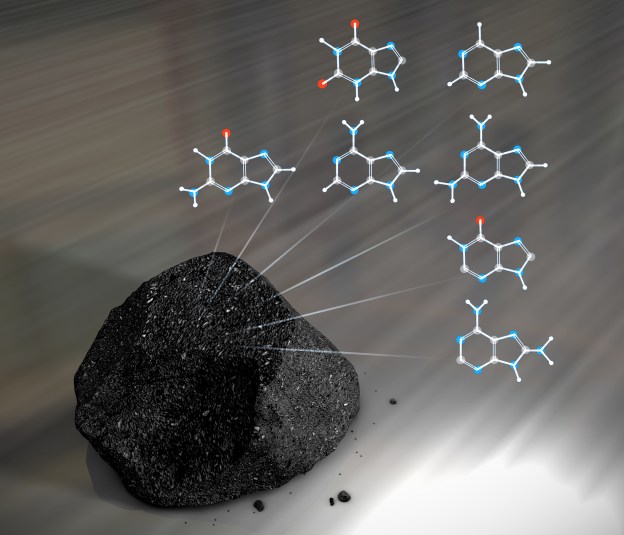
New evidence shows that the ingredients for life on Earth may have originated in outer space, according to recently revealed findings from a group of NASA-funded researchers. The scientists discovered that building blocks of DNA, the unique molecule that carries the genetic instructions necessary for life to develop, which they found in meteorites, were likely created in space.
“People have been discovering components of DNA in meteorites since the 1960’s, but researchers were unsure whether they were really created in space or if instead they came from contamination by terrestrial life,” said Dr. Michael Callahan of NASA’s Goddard Space Flight Center, and the lead researcher of the discovery. “For the first time, we have three lines of evidence that together give us confidence these DNA building blocks actually were created in space.”
The Goddard team’s discovery adds to a burgeoning body of evidence that the asteroids and comments contain chemicals that have the capability of creating life. The Wild 2 comet, for instance, contained certain amino acids, which are used to make proteins, an essential part of any living thing.

According to the NASA.gov website, the team discovered adenine and guanine, which make up parts of DNA called nucleobases. The structure of DNA looks like a spiral ladder; adenine and guanine join together to form the rungs of the ladder. (Nucleobases thymine and cytosine also form the rungs.) The team also found hypoxanthine and xanthine, which are used in various biological process, but are not part of DNA.
The team ruled out the possibility that the compounds come from contamination on Earth because the nucleobases they uncovered do not occur naturally on this planet in the form in which they found them. In addition, the Antarctic ice from which the meteorites were found did not have the chemical makeup that would support terrestrial contamination theories. They also found that the nucleobases were created in an entirely non-biological manner.
“In the lab, an identical suite of nucleobases and nucleobase analogs were generated in non-biological chemical reactions containing hydrogen cyanide, ammonia, and water. This provides a plausible mechanism for their synthesis in the asteroid parent bodies, and supports the notion that they are extraterrestrial,” says Callahan.
Watch a video about the discovery below:
Editors' Recommendations
- NASA is operating its Mars Curiosity rover from workers’ home offices
- NASA’s Perseverance rover’s new wheels can grip and better withstand rocks
- NASA suspends work on the James Webb Space Telescope
- NASA suspends work on Space Launch System and Orion, may delay moon mission
- SpaceX and NASA still set for historic May mission despite coronavirus


